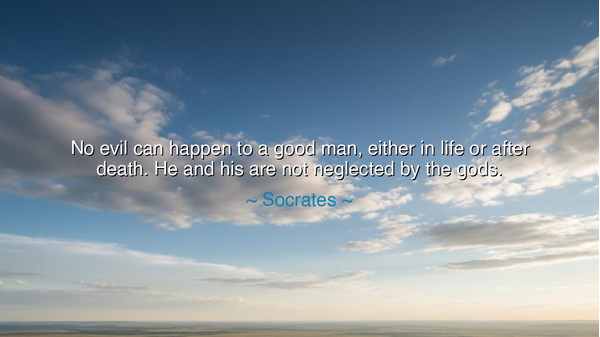
No evil can happen to a good man, either in life or after death.
No evil can happen to a good man, either in life or after death. He and his are not neglected by the gods.






In the immortal and tranquil words of Socrates, the sage who faced death with a calm heart, there glows a truth that has defied centuries of fear: “No evil can happen to a good man, either in life or after death. He and his are not neglected by the gods.” Spoken in the final moments before his execution, these words are not a denial of suffering, but a triumph over it. They reveal a wisdom so deep that it cannot be shaken by pain, injustice, or even death itself — for the good man, Socrates teaches, carries within him a harmony that no external force can corrupt.
The origin of this saying lies in Plato’s dialogue Apology, which recounts the trial and death of Socrates. Accused of impiety and of corrupting the youth of Athens, he stood before the court not as a criminal, but as a man faithful to truth. He refused to beg for mercy or renounce his teachings. When the judges condemned him to die, he accepted the verdict without bitterness. In his final address, he spoke these words — not to comfort his followers, but to instruct them. For Socrates knew that evil does not reside in the actions of others, nor in the accidents of fate, but only in the corruption of the soul. As long as the soul remains just and pure, nothing — not poverty, not pain, not death — can truly harm it.
To understand this, we must grasp the heart of Socrates’ philosophy: that the soul, not the body, is the true self. The body may be struck, chained, or slain, but the soul is beyond reach. Evil, then, is not what befalls us, but what we choose. When a man betrays truth, when he acts with cruelty or deceit, he harms his own spirit — and that, Socrates says, is the only real misfortune. The good man, who lives by virtue, stands unassailable. Even in chains, he is free; even in death, he is victorious. For the gods — or, as we might say today, the divine order of the universe — never abandon the just. The harmony within them mirrors the harmony of the cosmos itself.
There is a tale from later centuries that echoes this wisdom — the story of Boethius, a Roman philosopher unjustly imprisoned by a tyrant. As he awaited execution, he wrote The Consolation of Philosophy, asking why misfortune had befallen him. Through contemplation, he came to the same conclusion as Socrates: that true good lies within the soul, untouched by the chaos of the world. His chains could bind his body, but not his mind. His death could end his life, but not his dignity. And so he met his fate serenely, knowing that no evil can happen to a good man. In every age, those who walk the path of virtue rediscover this same truth.
This teaching is not only for philosophers, but for all who seek peace amidst turmoil. Consider the man who loses wealth, yet keeps his integrity; the woman who endures betrayal, yet forgives; the parent who suffers loss, yet continues to love. These are the living heirs of Socratic wisdom. The good person does not depend on fortune, for their treasure lies within. The storms of life may rage, but they cannot drown a soul anchored in righteousness. And when death comes — that final mystery — the good man meets it without terror, for he knows that the gods do not forsake those who have lived in harmony with truth.
Yet, my child of tomorrow, let not this teaching make you arrogant or indifferent. Socrates did not mean that goodness shields one from pain; he meant that it transforms pain into purpose. The world will still test you — with loss, injustice, and uncertainty. But when you choose virtue over vengeance, wisdom over pride, love over bitterness, you transform suffering into strength. Then, like Socrates, you will find that evil cannot touch you — not because you are spared from harm, but because you have risen above it.
So learn this lesson, and carry it in your heart: evil can destroy only those who allow it within. The good man is guarded not by wealth, nor by armies, but by the fortress of his soul. Cultivate that fortress through truth, justice, and humility. Seek to live not without suffering, but without corruption. And when the world seems cruel, remember that the gods do not neglect the good — for goodness itself is the language of the divine.
For as Socrates teaches, death is no tragedy to the virtuous; it is merely a passage from one harmony to another. Live, then, as though no misfortune can truly harm you — for in truth, it cannot. When your heart is steadfast in goodness, you are already immortal.






AAdministratorAdministrator
Welcome, honored guests. Please leave a comment, we will respond soon